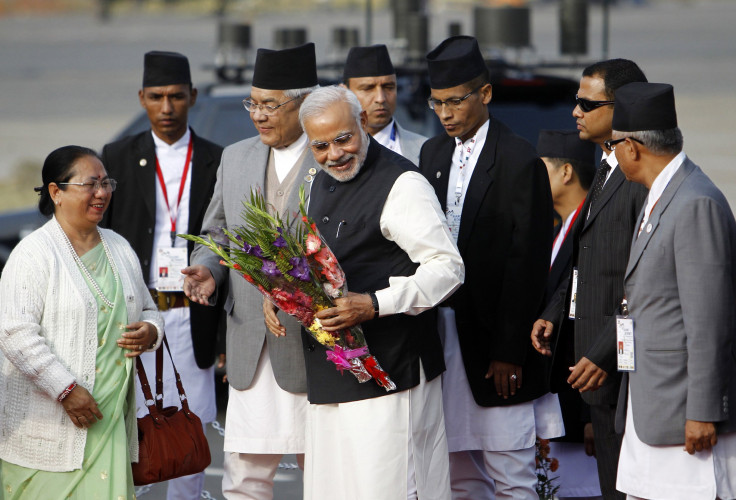Modi Woos Businessmen From SAARC Countries, But Tensions With Pakistan Could Scuttle His Moves

India's Prime Minister Narendra Modi on Wednesday announced several measures to improve trade as well as India's standing among countries that are part of the South Asian Association for Regional Cooperation (SAARC) bloc. However, India's acrimonious relationship with Pakistan, threatens to undo these efforts.
Addressing his maiden SAARC summit in Kathmandu, Modi said India would issue three-year to five-year business visas for businessmen from the SAARC bloc, which includes Afghanistan, Bangladesh, Bhutan, India, Maldives, Nepal, Pakistan and Sri Lanka.
“We speak of ease of doing business in India. Let's extend this to our region. I promise to ensure that our facilities at the border will speed up, not slow down, trade. Let's all make our procedures simple, our facilities better, our standards common and our paperwork less burdensome,” Modi said, while speaking at the 18th SAARC Summit, and noted that the bloc currently accounted for less than 5 percent of the region's global trade.
However, Modi’s plans to boost trade among India’s neighbors could fail as India and Pakistan continue to spar over crucial issues like security, connectivity and electricity.
“As of now, despite us trying very hard and several other countries keen to have concrete agreements on connectivity and electricity, there is no conclusive decision,” India’s foreign ministry spokesman Syed Akbaruddin said, in Kathmandu, according to a Bloomberg report. “One state has indicated they are yet to complete their internal processes,” he added.
Modi is unlikely to meet his Pakistani counterpart Nawaz Sharif at the summit, according to several news reports. In May, after Sharif met Modi in New Delhi, the two countries had announced the resumption of a foreign secretary-level engagement, which India called off in August, after the Pakistani High Commissioner met with Kashmiri separatist leaders. India has refused to resume talks since then.
At the summit, Sharif reportedly spoke of "a dispute free South Asia where instead of fighting each other we fight disease and poverty," and, without mentioning India, added: "We are committed to dispute free South Asia, need bonds of trust to solve our problems."
The India-Pakistan rivalry has meant that countries within the bloc have had a dismal record when it comes to trading among themselves. While the annual official trade between the two countries is about $2.7 billion, a 2012 report by the Federation of Chambers of Commerce and Industry estimated that informal trade between the two neighbors stood at $10 billion.
On the eve of the summit, India rejected Pakistan’s demand that China be given a greater role in the group, The Hindustan Times newspaper said in a report, adding that China has been pressuring various SAARC countries to make it a dialogue partner in the regional forum. SAARC currently has nine observers -- Australia, China, the European Union, Iran, Japan, Korea, Mauritius, Myanmar and the U.S., but they play no role in the deliberation of the regional group.
According to NDTV, an India-based news network, China has sent Vice Foreign Minister Liu Zhenmin to the summit, and state-run Xinhua cited a foreign ministry spokeswoman in Beijing as saying that, "China attaches great importance to SAARC's status and function," and is "willing to elevate the level of its relationship."
On Wednesday, Modi further announced India’s assistance to make up for the shortfall in funds for the establishment of a regional effort to combat tuberculosis and HIV. “We offer the five-in-one vaccine for the children of South Asia. We will support monitoring and surveillance of polio-free countries, and provide vaccines where it might reappear. And, for those coming to India for medical treatment, India will provide immediate medical visa for the patient and an attendant,” he said.
Ever since Modi assumed office in May this year, after a landslide electoral victory, he has been courting India’s neighbors. He had invited all the heads of SAARC countries to his swearing-in ceremony and followed this up with visits to Bhutan, Nepal and Myanmar, which had earlier sought membership in the bloc. He is expected to visit Sri Lanka in January.
Nepal's former prime minister, Baburam Bhattarai, wrote in the Republica newspaper: "More often than not, India-Pakistan disputes have overshadowed the organization," according to Reuters. "It is now time for India to take the lead."
© Copyright IBTimes 2024. All rights reserved.











